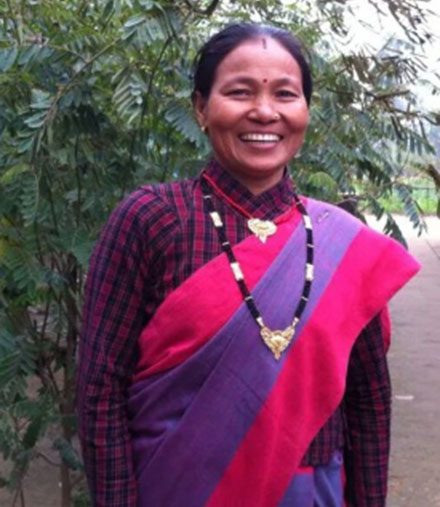
Married at 18, Basmati Buda is now 42 and has five children.
Although not formally educated, she can read and write her own name after completing a government adult literacy program. In 2008, Basmati and her family moved to Fattepur, a village in the remote hills of Nepal’s Banke District, with hopes for a better life. But hunger and poverty continued to haunt them as their circumstances didn’t change much.
Before joining a Heifer Nepal project and self-help group (SHG), Basmati raised a few goats and a buffalo to cover household expenses, while her husband worked as a wage laborer to supplement their income. All domestic responsibilities, including caring for her elderly in-laws, fell on Basmati’s shoulders.
“When my children were really young and I couldn’t leave them alone at home, I would take them with me into the forest while the livestock grazed,” Basmati said, remembering the struggle. “Without proper footwear, my feet would be covered with blisters after walking all day. It got worse during the monsoons. The river would rise, making it impossible to return back to our village after collecting fodder.”
In spite of the hardship, the walks to the forest barely made any money for the family. That is when she decided to quit goat raising.
In September 2012, Heifer Nepal started the Strengthening Smallholder Enterprise project in Fattepur, giving Basmati the opportunity to join the Pragati SHG. Through her group she received training on income generation and capacity building. These trainings gave her a fresh perspective and a greater vision to work toward, but she remained hesitant to raise goats again.
“After we moved to Fattepur, I had a lot of difficulty adjusting in my new environment,” Basmati said.
Her neighbors would yell at her and call her names when her livestock ate from the community nursery, which was prohibited by law. “I knew I shouldn’t allow them to graze there,” Basmati said. “But I didn’t know any other way.”
After completing training on fodder and forage management, Basmati started her own nursery. She planted seeds and saplings on the perimeter of her 0.8-acre farm. As the plants prospered she decided to try raising goats again.
Give a woman what she needs to prepare and prosper.
In the past year, Basmati’s goat raising has earned an extra $120. On top of that, her garden earnings total $100. She netted $166 from selling fodder, $466 from dairy products, and $250 from swine. Basmati prepared well, and her hard work is paying off. Her cow recently delivered a calf through artificial insemination, and she has added seven goats and one breeding buck to her livestock herd.
“You have to be prepared,” Buda said. “Before jumping back to goat raising I wanted to have enough forage to provide for them and to build a better shed. Now, I am accepted in my community and my neighbors are happy as well.”
Photos courtesy of Heifer Nepal